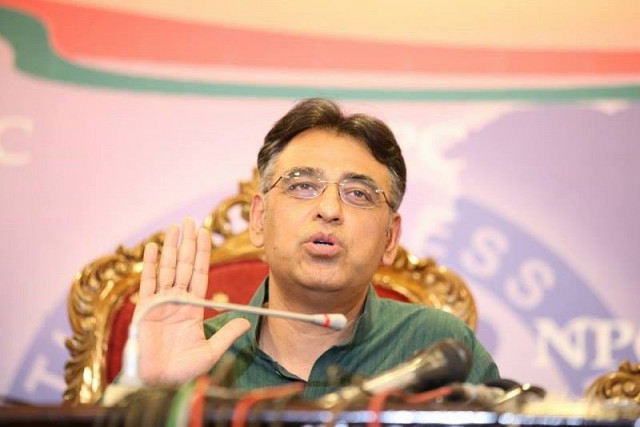PTI govt's roadmap to stability centres around fiscal discipline
PTI govt hints at allowing western neighbours to trade with India through Pakistan's land route

Finance Minster Asad Umar. PHOTO: PTI
In addition, the government hinted at allowing western neighbours to trade with India through its land route.
Federal Minister for Finance Asad Umar on Monday announced adhering to fiscal discipline while unveiling the Medium-Term Economic Framework (MTEF) report titled: 'Road map to Stability, Growth and Productive Employment' to address three ‘chronic gaps’ that have thrown the country deeper into a debt trap.
“In the short run, the poor and the vulnerable are disproportionately affected by the hardships of stabilisation and structural adjustment as gaps are addressed,” said the minister.
In its plan, the government decided to bring energy prices to the cost recovery levels, and has restarted automatic quarterly tariff adjustments.
It also decided to set up Fiscal Coordination Board to improve coordination with the provinces, which is also part of the IMF recommendations.
Pakistan, IMF at odds over Rs5.4tr tax collection target
Prime Minister Imran Khan had directed Umar to unveil the plan.
“The roadmap has been prepared with the help of independent economists and three multilateral agencies,” said the finance minister at the launching ceremony.
“But despite implementation of the five-pillar plan, the public debt-to-GDP ratio will be 70% at the end of the PTI’s term,” admitted Umar.
He said that he could not hide this truth from the nation.
A 70% debt-to-GDP ratio is considered alarming for a developing country like Pakistan. Pakistan’s total debt, which is currently at 73.5% of GDP, is very high which according to the World Bank would peak to 83.2% by June this year.
“The fiscal framework has completely broken and the government is going to introduce a new public finance management system through an act of parliament by the end of this month,” said Umar.
“The hands of the federal cabinet and the Finance Division will be tied when it comes to approving the supplementary budget,” said the finance minister.
He said from the next fiscal year no supplementary budget will be approved without the prior approval of parliament, except for a contingency fund.
This will be completely different from the current system where the federal cabinet every week approves the supplementary budget, increasing the prospects of a historic budget deficit of over Rs2.6 trillion by the end of this fiscal year.
It was a longstanding demand of the IMF that Pakistan should amend its laws to give back the power of issuing the supplementary budget to parliament.
Umar said Pakistan was keen to promote regional trade -- including with India and Iran. He said that there was also a need to revive the Regional Cooperation and Development (RCD). Pakistan, Iran and Turkey had formed the RCD in 1964.
Umar said Pakistan also wanted to trade with Europe through Iran and Turkey. “In return, Turkey can get access to India and China via Pakistan,” he added.
The minister said Pakistan wanted to enhance trade ties with India, hoping that the composite dialogue between the countries may start after the general elections in India.
The minister spoke about his government’s plans to come out of the economic crisis situation but admitted that “it would take some time and the reforms” will create difficulties for the people.
“The present government is committed to the path of sharp adjustment and infusion of external financing and social safety nets for the poor,” according to the plan.
“The crisis is over and now we are in the stabilisation process that will continue for another one-and-a-half years,” said the minister. Once the economy is stable, the country can move towards sustainable growth, he added.
But the government’s plans to follow the stability path would mean there will be less economic growth, higher unemployment and poverty.
Umar said the country’s primary balance – expenditures excluding interest payments -- has exceeded even the dangerous threshold.
He said the government was borrowing to pay interest on loans instead of retiring the loans.
The minister also hinted at linking the exchange rate policy with the Real Effective Exchange Rate, indicating that there will be more currency devaluation.
The existing exchange rate arrangements and possible limits of the government borrowing from the SBP will also be clarified in line with prioritising price stability as an objective of monetary policy, according to the plan.
In order to bring greater discipline in money market and exchange rate regimes, the government is considering giving the State Bank of Pakistan (SBP) greater operation and institutional independence, it underlines.
“The exchange rate is not a measure of a strong economy. At one point, the Pakistani rupee was stronger than the Japanese yen, even though the latter's per capita income was much higher than ours”, said the finance minister.
He also expressed his frustration with anchorpersons and said that business reporters — "who have a much better understanding of the economic technicalities” should sit with the anchorpersons and share their knowledge on how to report on the economic matters.
Umar said instead of taking easy decisions influenced by the news cycle or elections, the PTI government wanted to devise policies that will strengthen the economy in the long term.
Umar said the country was facing three gaps -- revenue-expenditure, export-import and savings-investment.
The minister said the revenue was not enough to cover even current expenditures.
He said the exports were far lower than the imports, which led to a historic current account deficit.
Pakistan’s savings -- 10% of GDP -- were not sufficient to undertake major development initiatives and the country was heavily relying on foreign savings.
The “chronic deficits have led to underperformance of Pakistan GDP”, he added.
He proposed lowering the revenue-expenditure gap, reducing export-import gap, narrowing the saving-investment gap, protecting the poor and the governance reforms as his five-pillar strategy to deal with these issues.
Umar said that as a result of these policies Pakistan’s economy will achieve the highest economic growth rate in 15 years in 2023.
He said the size of Pakistan’s economy could grow to $2 trillion by 2047 from mere $300 billion.
Asad Umar’s economic shock therapy — crazy or genius?
The minister claimed that inflation will be below 5% by 2023 and the budget deficit will be 4% of GDP when the PTI would complete its five years in the office.
He hoped Pakistan will be an upper middle income country where per capita income will be $4,000 a year from current $1,600.
The government will create 10 million jobs – the highest job creation of any government, claimed the finance minister.
He said that inflation will be stable below 5% due to the SBP Inflation targeting framework.
The exchange rate stability will be ensured and there will be no more balance of payment shocks in 2023. The social protection will be scaled up to the highest for any government and exports would jump to $40 billion.
The minister claimed that his five-pillar plan will lift 10 million households out of poverty net.
“Pakistan,” the minister said, “in 2023 would not be looking for another IMF deal, if this plan is successfully executed.”
The government will also abolish assignment accounts that are outside the treasury single account (TSA). By the end of 2018 there was an estimated Rs1.4 trillion in the assignment accounts.
The government plans to use the Fiscal Coordination Board (FCB) – which comprises the federal and all four provincial finance ministers, as a mechanism to better coordinate federal and provincial fiscal activities so as to ensure greater fiscal discipline and that all governments to move toward attainment of common macroeconomic goals.
In the past, the provinces have refused to accept the board due to other constitutional mechanisms that are in place.



















COMMENTS
Comments are moderated and generally will be posted if they are on-topic and not abusive.
For more information, please see our Comments FAQ